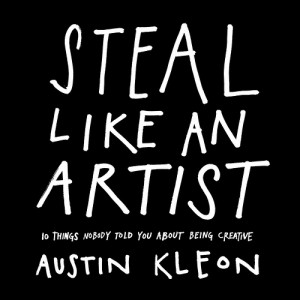
2. Don’t wait until you know who you are to get started.
3. Write the book you want to read.
4. Use your hands
These are just 3 of the 10 pieces of wisdom that this week’s guest, Austin Kleon, wants to pass along. But wait…where is #1? Ahhh, good question. The first piece of advice is also the title of his most recent, New York Times best seller, Steal Like an Artist. So what does THAT mean? Well literally it means that all art has already been created in some fashion; therefore, anything that is now created is partly stolen from someone, somewhere. But more figuratively, it means a lot of things. It is an idea, a mantra if you will. It means how to be creative, how to generate ideas, how to use what HAS been done as a way to figure out what CAN be done. Nothing is new. Personally, this book jumped out to me for one reason. Every day of my life I come up with some new idea or invention (I know, I know – I’m not alone here) and I get all excited until I type it into google just to realize it has already been done in some fashion. But what Steal Like an Artist says, is that just because it’s been done doesn’t mean it can’t be done BETTER. It’s time to get creative with Austin Kleon.
Austin is a writer, artist, speaker, and New York Times best-selling author. He’s written two books: Steal Like An Artist, and Newspaper Blackout. His art has been called “brilliant” by New York Magazine and The New Yorker said his poems “resurrect the newspaper when everyone else is declaring it dead.” His work has been featured on 20×200.com, NPR’s Morning Edition, and PBSNewshour, and in Time, The Atlantic, Forbes, and The Wall Street Journal. He’s spoken about creativity, visual thinking, and being an artist online for organizations such as Pixar, Google, SXSW, TEDx, andThe Economist. Visit him online at www.austinkleon.com.
*Remember to subscribe to the podcast on iTunes!
I wondered if anyone of you has read T.S.Eliot’s ‘Tradition and the Individual Talent’? It says much the same things that Austin has been talking about, that every artist is part of a bigger family and one should get to know the family’s genealogy or put more simply, to learn the rules and then break them. I’d recommend it if you haven’t read it, it has some pretty interesting analogies of the poet’s mind to that of a catalyst in a chemical reaction. 🙂
Here is a link to the essay – http://www.bartleby.com/200/sw4.html/
Also, I don’t know if Bill Hicks was the first one to talk about this (I’m pretty sure he wasn’t), but as I understand it we shouldn’t imitate,rather evolve ideas.